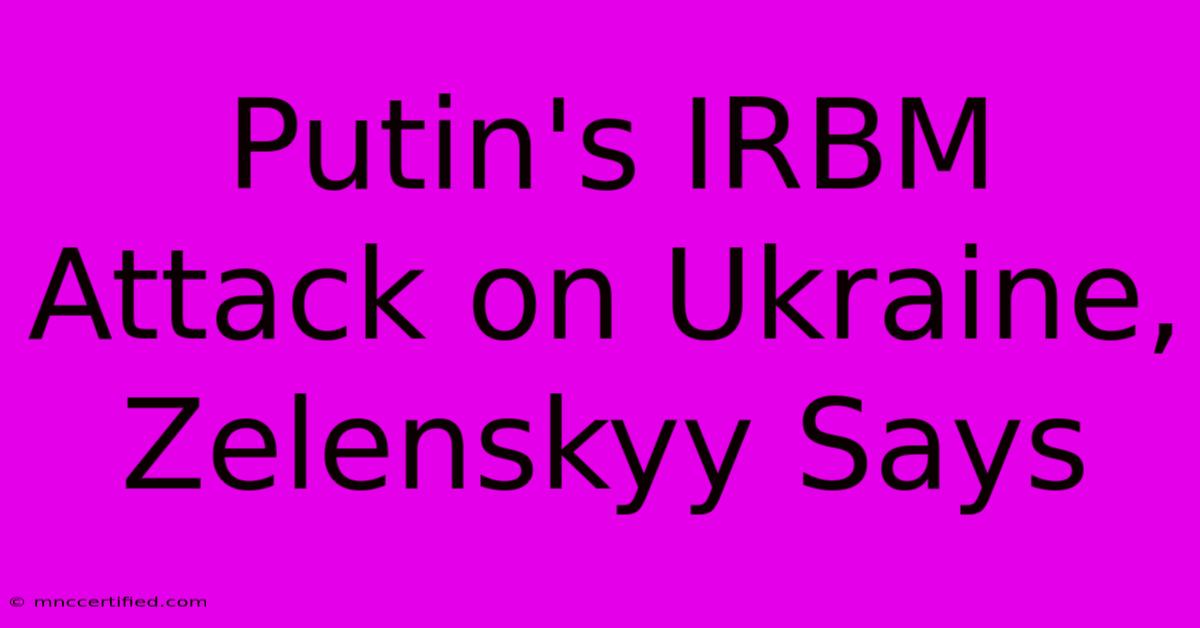Putin's IRBM Attack On Ukraine, Zelenskyy Says

Table of Contents
Putin's IRBM Attack on Ukraine, Zelenskyy Says: Escalation of the Conflict?
On [Insert Date of Alleged Attack], Ukrainian President Volodymyr Zelenskyy accused Russia of launching an Intermediate-Range Ballistic Missile (IRBM) attack against Ukraine. This claim, if verified, represents a significant escalation of the ongoing conflict and raises serious concerns about the potential for further international involvement. This article delves into the details of the alleged attack, its implications, and the international response.
Zelenskyy's Accusation and the Lack of Independent Verification
Zelenskyy's statement, delivered via [Specify platform, e.g., a televised address, social media post], directly accused Russian forces of deploying an IRBM. He provided [mention any details provided, e.g., location of impact, type of damage, casualties] to support his claim. However, at this stage, independent verification of Zelenskyy's assertion is crucial. Credible international organizations and investigative journalists are actively working to independently assess the validity of these claims. The lack of immediate confirmation from Western intelligence agencies or international monitoring groups underscores the need for caution and a thorough investigation.
The Significance of an IRBM Attack
The use of an IRBM would represent a major shift in the nature of the conflict. IRBM attacks differ significantly from shorter-range missiles and artillery frequently used in the war. Key distinctions include:
- Range: IRBMs have a much longer range, potentially enabling strikes on targets deep within Ukrainian territory, or even beyond.
- Payload: IRBMs can carry a heavier payload, including potentially more destructive warheads.
- Strategic Implications: The deployment of such weapons signifies a clear escalation in Russia's military strategy, suggesting a potential shift towards more aggressive tactics.
The international community is closely monitoring the situation to ascertain whether this alleged attack marks a turning point in the war. The consequences of confirmed IRBM use could have far-reaching effects on the global security landscape.
International Response and Potential Consequences
The alleged IRBM attack has prompted a wave of international reactions. [Mention specific responses from key international actors, e.g., NATO, the EU, the US]. These responses range from expressions of concern to [mention specific actions, e.g., condemnation, promises of further aid, warnings to Russia].
Potential for Further Escalation
The use of IRBMs significantly raises the stakes of the conflict. It could trigger a wider response, including:
- Increased military aid to Ukraine: Western nations may provide more advanced weaponry to help Ukraine defend itself against this new threat.
- Further sanctions on Russia: International pressure on Russia may intensify, leading to more stringent economic sanctions.
- Direct military intervention: Although unlikely, the possibility of direct military intervention by NATO or other international actors cannot be entirely dismissed, especially if the attacks are deemed to cross a red line.
The situation remains highly fluid and unpredictable. The coming days and weeks will be crucial in determining the international community's response and the potential trajectory of the conflict.
The Importance of Fact-Checking and Reliable Information
In the context of an ongoing conflict, the spread of misinformation and disinformation is rampant. It is crucial to rely on credible news sources and official statements from verified accounts when assessing the situation. Avoid spreading unverified information, particularly on social media, as this can contribute to the spread of false narratives and exacerbate tensions.
Keyword Optimization: Putin, Zelenskyy, IRBM, Intermediate-Range Ballistic Missile, Ukraine, Russia, conflict escalation, international response, military attack, war, sanctions, NATO, military aid, disinformation, fact-checking, credible news sources.
Off-Page SEO Strategies: This article should be promoted through social media channels and relevant online communities. Consider submitting the article to reputable news aggregators and relevant websites. Building high-quality backlinks from authoritative sources is crucial for improving search engine rankings. Engaging with comments and fostering discussion around the article can also positively influence SEO.

Thank you for visiting our website wich cover about Putin's IRBM Attack On Ukraine, Zelenskyy Says. We hope the information provided has been useful to you. Feel free to contact us if you have any questions or need further assistance. See you next time and dont miss to bookmark.
Featured Posts
-
Arsenal Juventus Womens Ucl Match Result
Nov 22, 2024
-
Bengals Steelers Stars Win Prediction
Nov 22, 2024
-
Russia Ukraine Conflict Escalates After Long Range Missile Use
Nov 22, 2024
-
Ted Dansons New Netflix Sitcom Review
Nov 22, 2024
-
Over 83 Tons Of Beef Recalled
Nov 22, 2024